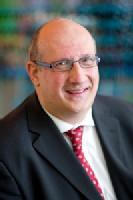WMG News
Largest miscarriage research centre in Europe to benefit from IDH expertise
 The University of Warwick has been selected to be a partner in the largest miscarriage research centre in Europe.
The University of Warwick has been selected to be a partner in the largest miscarriage research centre in Europe.
Funded by the leading pregnancy charity, Tommy’s, researchers from the Institute of Digital Healthcare (IDH) and Warwick Medical School (WMS), will be joining doctors from University Hospital, Coventry to investigate the causes of early miscarriage.
The Institute of Digital Healthcare, at the University of Warwick, will develop a clinical database, led by Professor Theo Arvanitis, to support the work of the Centre and improve on outcomes based on information-driven approaches.
The Centre’s clinical database will be using modules of the Comprehensive Unified Research (CURe) Framework, previously developed by IDH. The objective of the CURe framework and its associated web applications is to develop a new approach to get researchers in different specialties to start thinking of prospective studies and what data they need to collect that would be useful to them and their colleagues. Common data elements to all medical areas, as well as specialist requirements are handled by the framework. For this work the main modules on medication and basic patient information, together with a full Terminology and Vocabulary Service will be offered, to build the new database which will collect essential data on miscarriage incidents so that prevention strategies can be devised based on the analysis of these data.
The Institute of Digital Healthcare is a partnership between two University of Warwick departments, WMG and Warwick Medical School, whose aim is to improve people's health and wellbeing through the development, evaluation and use of innovative digital technologies and services.
The miscarriage research centre will help patients like new mum Nicola from Nuneaton who suffered the heartbreak of losing three pregnancies in just 18 months. However after taking part in a trial led by Warwick Medical School’s Professor Siobhan Quenby and her team based at University Hospital, they were able to give her hope. The research trial tested a new medication which could help her to have a healthy pregnancy.
Nine months later, in June 2015 Nicola and her husband Ryan welcomed baby Isabella to the world.
It is hoped that thousands more women like Nicola who suffer from early miscarriage, will benefit from the world class research taking place in Coventry. New trials include scratching the lining of a women’s womb to help improve the chances of embryos implanting and a diabetes drug which is hoped can help women who have had five or more miscarriages.
There are approximately 250,000 miscarriages every year, with about one in three women experiencing recurrent miscarriages.
Nicola said: “We started to think that we were never going to have a family, but the trial gave us hope and we decided to give it one last go. I’m so glad we did, and without Professor Quenby and the fantastic midwives, chances are I wouldn’t be a mum. I can’t thank them enough for everything they did for us and hope that more women who think there is no hope, give it one last try and take advantage of this fantastic team right here on our door step in Coventry.”
You can watch a video of Nicola talking about her struggle and treatment here
Professor of e-Health Innovation and Head of Research at the Institute of Digital Healthcare, Theo Arvanitis, said: “I am delighted that our team of researchers in IDH will contribute their clinical research informatics and data analytics expertise to the work of this Centre. Together with our clinical colleagues, we aspire to contribute in understanding better the challenge of miscarriages, while improving on the desired outcome of reduced rates on loss of pregnancy, both nationally and in Europe”.
Jane Brewin, CEO of Tommy’s said: “Medical science doesn’t fully understand miscarriage which is why funding and research is so critical.
“Through pioneering medical research, Tommy’s clinicians will save babies’ lives by turning their discoveries into screening tests and treatments and launch clinics for pregnant women who are most at risk, giving them the latest improvements in care. They’ll share their work in national clinical guidelines, preventing miscarriages and developing better care across the country.”
The research centre will open in April 2016.
